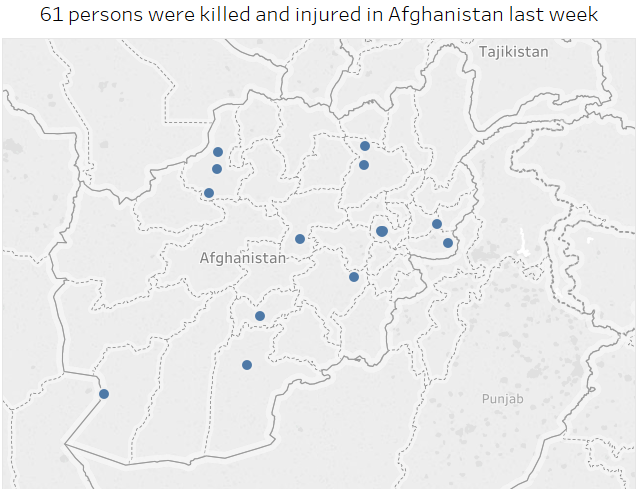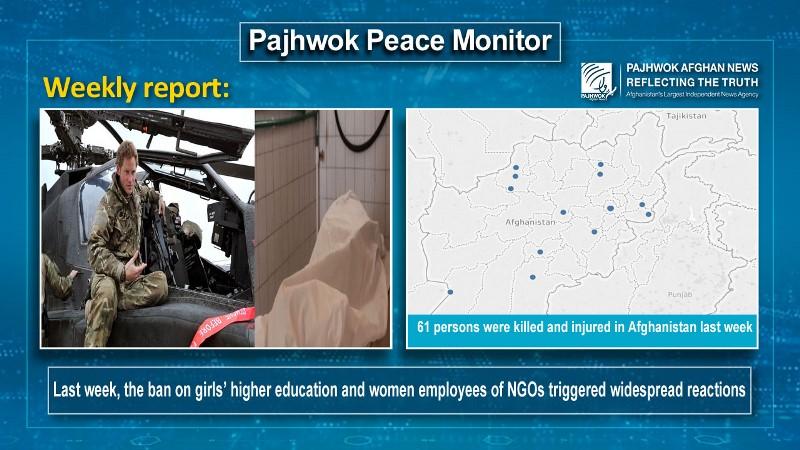KABUL (Pajhwok): Last week, the ban on girls’ higher education and women employees of NGOs triggered widespread reactions, with the acting minister of interior saying work is underway on a reasonable and permanent solution.
Last weeks’ key events:
- UN: About 86 percent activities of 151 organisations either halted or limited due to the ban on women workers.
- UNAMA pays all female staff their monthly salaries.
- A number of residents of Khost, Faryab and Nimroz called for removal of restrictions on girls and women workers.
- Minister of Interior: Work is ongoing to find a permanent solution to problems related to girls’ education and women’s work.
- Pakistan: If threated by groups like TTP, we have legal authority to take military action against them in Afghanistan.
- In response, the Ministry of Defence said Afghanistan had better experience than others in defending itself.
- Interior Minister of Pakistan: I have never said Islamabad is attacking the territory of Afghanistan.
- Maulvi Abdul Kabir: The Islamic Emirate has fulfilled all conditions for recognition and the UN should give ot Afghanistan’s seat.
Casualties:
Last week, at least 40 people were killed and 21 others wounded in different incidents across the country.
Zabihullah Mujahid, spokesman for the Islamic Emirate, said 11 Daesh (Islamic State) members were killed and seven others wounded in raids on the group’s hideouts in Kabul, Nangarhar and Nimroz provinces.
Al-Jazeera reported 14 people were killed and 18 more wounded as a result of a blast at the gate to the military airport in Kabul last week.
Security forces rescued a businessman and killed four of his kidnappers in a Kabul raid, the Ministry of Interior said on Tuesday.
Based on reports, unidentified gunmen shot dead two people in Uruzgan and Faryab. Three bodies were found in Ghazni, Bamyan and Faryab. A woman was killed by an alleged robber in Faryab.
Two young men were killed as a result of a clash among members of a family in Baghlan. One alleged robber was killed and another wounded in the same province.
According to reports, one individual was killed and a second wounded in an unexploded shell blast in Kandahar. In Torkham, one person was killed and another wounded after a security officer opened fire at them.
Note: Casualty figures are based on reports reaching Pajhwok. Some reports might not have reached the news agency or sources may not have provided exact figures.

At least 29 people were killed and 14 wounded in different incidents of violence in the country the week before last week.
Restrictions on women, girls:
On Dec 24, the Ministry of Economy (MoE) asked all national and international NGOs to send their female employees home until further orders.
The ministry said it had received “serious complaints” that women working for NGOs were not observing proper Islamic dress code, a charge used by authorities to justify the ban on university education for females.
UN Secretary-General’s Deputy Special Representative for Afghanistan Markus Potzel said restrictions on Afghan women were harming millions in need.
United Nations Assistance Mission in Afghanistan (UNAMA) tweeted that Potzel met Deputy Prime Minister for Administrative Affairs Abdul Salam Hanafi.
“Banning Afghan women working for aid agencies and locking them out of schools and universities harms millions in Afghanistan and is preventing critical help reaching Afghan men, women and children.”
Potzel expressed concerns about the ban on Afghan women’s education and other restrictions. But Interior Minister Sirajuddin Haqqani said they were working to find a logical and permanent solution to the girls’ education issue.
Haqqani met Potzel, UNAMA’s political affairs chief Scott Smith and the delegation accompanying them at his office, the Ministry of Interior said in a statement.
It added Potzel thanked the leadership of the Interior Ministry for cooperation and praised the improvement in the security situation in the country. He shared his concerns about the imposition of restrictions on girls’ education.
Potzel also met former president Hamid Karzai and stressed the need for lifting restrictions on women workers and girls’ education.
The Afghan Women Leaders Forum urged the UNSC to send a delegation to Kabul to discuss women’s work and girls’ education.
Last week, tribal elders in Khost, Faryab and Nimroz called upon the government to open all educational institutions for girls and give women the right to work for NGOs.
After the suspension of female NGO workers, UN Women said, 86 percent of activities of 151 organisations had either been stopped or curtailed.
UNAMA said it had paid all its Afghan female employees their monthly salaries. The UK warned the Taliban decision would threaten the future of Afghanistan.
The International Rescue Committee (IRC) asked the UN to engage the Taliban administration in a practical and coordinated manner to ensure female aid workers can safely and effectively work in the country.
Save the Children feared many minors would be forced to work in Afghanistan due to the Taliban-imposed restrictions. The UN also warned the Taliban ban would have a serious impact on humanitarian aid efforts in Afghanistan.
Women have been banned from working in None-Government Organisations (NGOs) due to insecure working environment and lack of government control on them, reasoned Zabihullah Mujahid, the IEA spokesperson.
In an exclusive interview with the BBC, he said according to their assessment, the honour and dignity of women working for NGOs was not secure. Therefore, he argued, the ‘Islamic Emirate had banned them from working.
Referring to the financial situation of some women who supported themselves and their families, he said: “This is a general decree for implementation based on Islamic Sharia and it is obvious some people will suffer. They should look for alternatives.”
He added: “For earning food, we should look for options described by the Shariah law. If someone says they will steal to earn livelihoods for their children, we cannot allow such things and this is un-Islamic.”
He said it was the government’s responsibility to protect the honour of women and provide them better living conditions.
Also, 18 different universities in Iran, the UK, the US, Qatar and elsewhere in the world announced hundreds of of scholarships for Afghan girls.
Afghanistan-Pakistan differences:
Last week, Pakistan’s Interior Minister Rana Sanaullah said his country, if attacked by the group from Afghan soil, reserved the right to target TTP hideouts across the Durand Line.
In Kabul, the Ministry of Defence responded Afghanistan was not “without an owner” and it had better experience than others in defending itself.
Meanwhile, Zabihullah Mujahid spurned the Pakistani interior minister’s claim as baseless. He said the Tehreek-i-Taliban Pakistan (TTP) did not have hideouts in Afghanistan.
Also last week, ex-president Hamid Karzai asked Pakistan to treat Afghan refugees humanely and in accordance with universal principles of human rights.
Karzai tweeted that the situation of Afghan refugees, especially women and children in Pakistani jails, was painful. He slammed Islamabad’s behaviour as a violation of values.
He once again called on Pakistan to behave like a good and civilised neighbour and treat Afghan refugees in line with international norms and human rights.
After reactions from Afghan officials, Rana Sanaullah said Islamabad was not planning to attack Afghanistan but would any country that threatened the interests of Pakistan.
Indian Foreign Minister J Shankar indirectly alleged the “centre of terrorism” was in Pakistan. However, Islamabad sees the allegation as a growing frustration by India over its failure to discredit Pakistan.
Earlier, the US Department of State said Pakistan had the right to defend itself from terrorism and asked the acting government to uphold its commitments that Afghan soil would never be used as a launch-pad for international terrorist attacks.
For its part, the caretaker government rejected the remarks by State Department spokesman Ned Price and said the Islamic Emirate remained committed to all its promises.
The deputy spokesman for the Islamic Emirate, Bilal Karimi, said there was no evidence to show that Afghan soil was used against any other country.
“All territory of the country is controlled by the Islamic Emirate and there is no evidence to show that there is any action from Afghanistan against other countries,” Karimi maintained.
Kabul’s demand for UN seat:
Deputy Prime Minister Abdul Kabir, in a conversation with Potzel, said the UN should hand over Afghanistan’s seat to the caretaker government, saying all conditions for recognition had been met.
Potzel said that UNAMA was a bridge between the Afghan government and the international community and was striving to remove the gap between.
Interior Minister Sirajuddin Haqqani asked Ulema from Egypt, Sudan and Palestine to convey the message of the people of Afghanistan to the world.
Haqqani to Prince Harry:
British Prince Harry acknowledged that he killed 25 Taliban fighters during his mission in Afghanistan in 2012-13.
“My number is 25. It’s not a number that fills me with satisfaction, but nor does it embarrass me,” Harry wrote in his memoir Space.
In another section, he described Taliban insurgents as “chess pieces” taken off the board, rather than people.
Interior Minister Anas Haqqani tweeted: “Mr. Harry! The ones you killed were not chess pieces. They were humans. They had families waiting for their return.
“Not many killers of Afghans have your decency to reveal their conscience and confess to their war crimes,” Haqqani wrote, insisting: “Our innocent people were chess pieces to your soldiers, military and political leaders. Still, you were defeated in that game…”
Bilal Karimi, the deputy spokesman for the government, said: “Harry’s confession shows that such crimes are not limited to Harry, but every occupying country has a story of such crimes in our country.”
sa/mud







GET IN TOUCH
NEWSLETTER
SUGGEST A STORY
PAJHWOK MOBILE APP